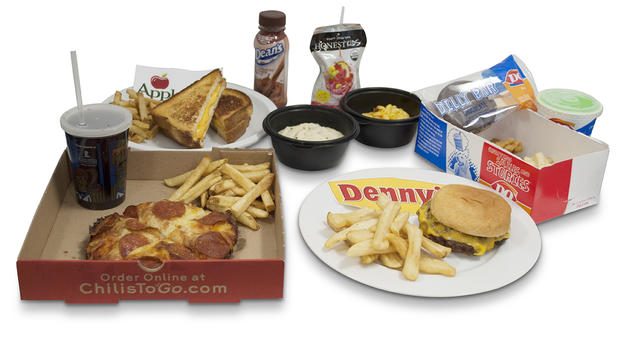Despite more options, 1% of fast food kids' meals healthy: Study
Children who eat fast food may be hard pressed to find a healthy meal, according to a new report from the Yale Rudd Center for Food Policy and Obesity.
The new report, Fast Food FACTS 2013, looks closely at the nutrition of kid's meals and how they are advertised to children. It tracks changes in these areas that occurred since the group's last report was issued in 2010.
"There were some improvements, but they have been small, and the pace too slow," Rudd Center director Marlene Schwartz, said in a statement. "Without more significant changes, we are unlikely to see meaningful reductions in unhealthy fast food consumption by young people."
For the report, researchers looked at 18 restaurants with special kids' menus for a total of 5,427 possible meal combinations. They found some improvements over the past three years: Three-quarters of restaurants with kids' meals increased healthy beverage options, and all restaurants except Taco Bell offered at least one healthy side option for their kids' meals. The group singled out McDonald's for introducing half-portions of french fries and apples as the default sides in Happy Meals.
The 5,000-plus figure represented a nearly 54 percent increase in the number of kids' meal options available, when factoring in main dish, sides and beverage options.
But most of the new menu items were not healthier -- the percentage of kids' meals that qualified as healthy remained at 1 percent, the same findings as the 2010 report. Only 33 kids' meal combos met nutrition criteria for elementary school students, and only 15 met standards recommended for preschoolers.
Six of the top 10 options were combinations of Arby's Kraft macaroni and cheese with apple slices and beverages including bottled water, ice tea and 100 percent juice and lowfat milk. The others included Burger King's chicken nuggets with sweet and sour sauce with apple slices and Nestea or Gold Peak unsweetened teas, and Subway's Veggie Delite and Roast Beef sandwiches (wheat bread, no cheese) with apple slices and 100 percent juice.
Only 3 percent of kids' meal combos met the food industry's voluntary Kids LiveWell standards.
The main dishes were the biggest culprits. The worst overall kids' meal calorie-wise was McDonald's McDouble with french fries and sugar-sweetened Hi-C Orange Lavaburst.
"All restaurants continued to offer large or extra-large soft drinks with 350 to 850 calories per serving and burger restaurants offered large french fries with 470 to 610 calories," the report added.
A March 2013 report from the Center for Science in the Public Interest that examined 34 fast food chains similarly found 97 percent of kids' meals did not meet the recommended nutrition standards.
Researchers also looked at marketing of foods to children from major chains.
For all advertising, fast food restaurants spent $4.6 billion in 2012, an 8 percent increase over 2009 spending.
Six companies were responsible for more than 70 percent of all television ads viewed by kids: McDonald's, Subway, Burger King, Domino's, Wendy's and Yum! Brands (Taco Bell, Pizza Hut, KFC).
The report showed while in 2012 there were 10 percent fewer TV ads shown for kids age 6 to 11 compared to the last report, children and teens overall continued to see three to five fast food ads on television every day.
Healthy foods represented only one-quarter of the fast-food ads. Advertisers upped their marketing to Hispanic preschool children by 16 percent, which concerned researchers since the Hispanic population is at higher risk for obesity.
Black and Hispanic children were more likely to visit fast-food websites than white and other non-Hispanic children.
The report also noted that social media and mobile devices that are popular with teens have led to expanded fast food marketing. It cited "child-targeted advergames" including McDonald's "McPlay" and Wendy's "Pet Play Games."
The authors call for fast food chains to stop advertising anything but the healthiest kids' menu items on children's television networks or websites and to stop reaching kids behind parents' backs through branded promotions.
They called on advertisers to stop showing ads to preschoolers, especially on Spanish-language networks.
"Most fast food restaurants stepped up advertising to children and teens," study author Jennifer Harris, director of marketing initiative at Rudd, said in a statement. "Most advertising promotes unhealthy regular menu items and often takes unfair advantage of young people's vulnerability to marketing, making it even tougher for parents to raise healthy children."

